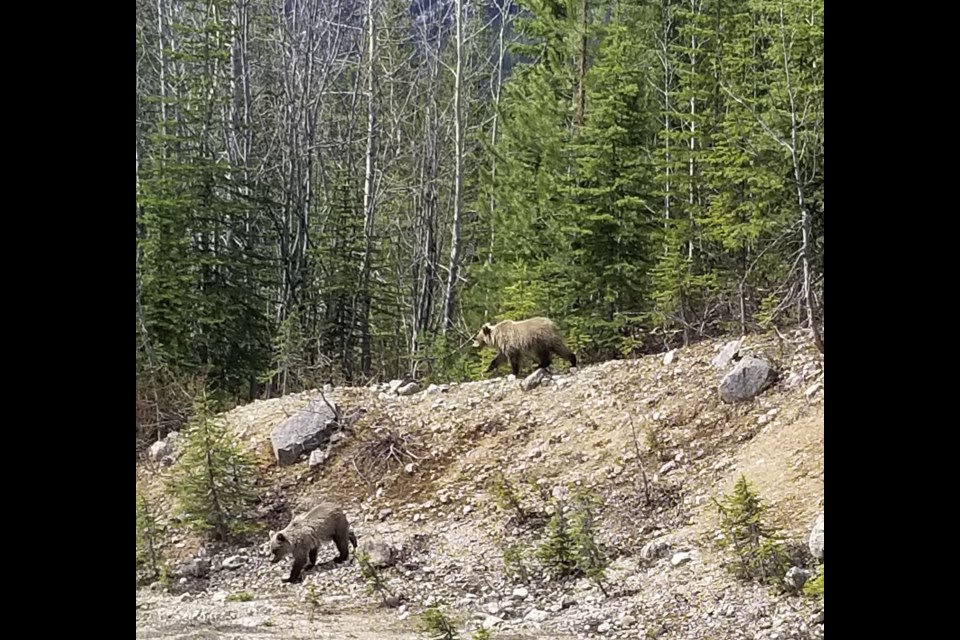FIELD – Two yearling grizzly bear cubs have been orphaned following the death of a well-known mama bear on the busy Trans-Canada Highway in Yoho National Park.
Female grizzly bear No. 156, who produced two litters of cubs in her nine years of life, was struck by a car on the highway about one kilometre east of Field mid-afternoon on Saturday (May 29).
The cubs, a male and a female, were relocated by wildlife specialists into a remote backcountry area within their mother’s traditional home range, which included parts of Banff and Yoho national parks.
Parks Canada wildlife experts say they wanted to give the one-and-a-half-year-old cubs every possible opportunity to remain in the wild, adding the young bruins were continuing to hang around the collision site on the weekend.
“There was a very high risk that they were going to get struck and killed as well,” said Jon Stuart-Smith, a human-wildlife management specialist for Lake Louise, Yoho and Kootenay.
A team of trained wildlife responders and experts assess individual situations and respond with management interventions aimed at the best possible outcomes for wildlife.
Previous research has indicated cubs in this region, on average, typically stay with their mothers for about four years. However, previous experience has shown one-and-a-half-year-old cubs have survived on their own in this area.
In 2011, two other cubs the same age were orphaned when their mother was struck by a train on the Canadian Pacific Railway line. One of the cubs survived four years before getting run over on the Trans-Canada Highway in Yoho in 2015. The male bruin sustained serious injuries and had to be euthanized on site.
Stuart-Smith gives bear No. 156’s cubs a greater than 30 per cent chance of making it on their own.
“There is precedent that they can survive on their own at this stage of their life,” he said.
“Every year the chances of surviving into adulthood get greater and greater.”
The siblings’ chances of beating the odds also get better if they stay together. They can forage for food together and be vigilant and on the look-out for predators.
“Siblings together often have a higher survival rate than when they’re on their own,” Stuart-Smith said.
The cubs weighed about 50 pounds, which is on the low side, but otherwise appeared healthy.
After the wildlife specialists handled them and put ear tags in each of them for future identification, the cubs were flown by helicopter to the release site.
“They were doing well and we let them go,” said Stuart-Smith said.
The bears are too little for GPS collars, which track where the animals travel. As bears grow quickly at this age, any collar would have had to come off in short order.
“Although it would have been very important information to get, we wanted to put their well-being and their chance of survival as the first priority,” Stuart-Smith said.
The biggest risk to the young bears is a large male grizzly bear predating upon them. Adult male bears are known to kill cubs that are not theirs – and it’s the mother that typically defends them.
The other great risk is the cubs return at some point to the deadly stretch of highway where their mother was killed in search of the easy-to-get roadside dandelions and vegetation.
Stuart-Smith said although there were limited relocation options because of snow in the high country, the bears were taken to an area with natural foraging opportunities.
He said he’s optimistic the cubs will find enough nutrition to sustain themselves through summer and fall in order to den up and make it through the winter with enough reserves to come out in the spring.
“Getting them away from the highway was important for us, but now it’s just a matter of them figuring out how to survive and feed themselves,” said Stuart-Smith.
“We’re hoping the conditions that we found for them are enough to keep them there and away from human habituation and the highway where they would have a higher risk of being struck or getting into trouble.”
Bear 156 spent most of her life in the backcountry, but historically brought her cubs down to the valley bottom by the Trans-Canada Highway for a few weeks each spring to feed on roadside green-up.
It is hoped No. 156’s cubs have learned the lessons she has taught them, including following the green-up as snow melts and feeding on natural food sources previously shown to them.
“She would spend most of her time in the backcountry in Banff and Yoho, and amazingly enough, not really run into anybody back there,” Stuart-Smith said.
“She probably would have moved them on to other habitat shortly, so it’s quite unfortunate she was struck at this time.”
Bear No. 156 was captured and fitted with a GPS collar as part of the joint Parks Canada-Canadian Pacific Railway five-year study on ways to reduce bear mortality on the train tracks.
This is her second litter of cubs. Her previous litter of two, which includes a rare white grizzly bear, has been spotted again this spring. Those bears are now in their fifth year.
“We have seen them periodically and thankfully most visitors have been respectful of their space,” Stuart-Smith said.
“Hopefully they continue to make a living and go on to produce offspring themselves as well.”
Parks Canada urges motorists to consider not stopping when they see bears by the side of the road if it is unsafe, but to stay in their vehicles if they do decide to pull over.
Following the death of bear No. 156, motorists are also reminded to observe speed limits and to drive with extra caution in the early morning and evening hours when wildlife are most active.
“These are really important things in order to avoid tragic incidents like this,” Stuart-Smith said.
Please report all wildlife sightings on the roads or any wildlife incidents to Parks Canada dispatch at 403-762-1470.




